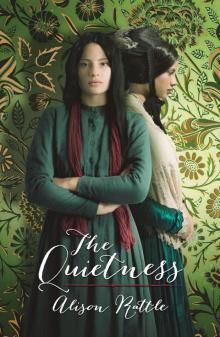- Home
- Alison Rattle
The Madness
The Madness Read online
Contents
Title Page
Clevedon, Somersetshire: 1868
1: A Mermaid On The Beach
2: The Journal Of Noah De Clevedon
3: Inside A Seashell
4: The Rat-Catcher’s Boy
5: A Tart And Some Gingerbread
6: A Twisted Leg
7: The Boy In Blue
8: The Journal Of Noah De Clevedon
9: Goose Pimples
10: A Blue-Trimmed Straw Hat
11: The Journal Of Noah De Clevedon
12: A Scrap Of Scarlet Ribbon
13: The Journal Of Noah De Clevedon
14: Salt And Fish
15: The Journal Of Noah De Clevedon
16: Like An Empty Pocket
17: The Journal Of Noah De Clevedon
18: Not One For Gossip
19: The Journal Of Noah De Clevedon
20: A Change In The Air
21: The Journal Of Noah De Clevedon
22: White Silk Stockings
23: The Journal Of Noah De Clevedon
24: Soiled Washing
25: The Journal Of Noah De Clevedon
26: The Lodger
27: The Journal Of Noah De Clevedon
28: Clevedon Manor
29: The Journal Of Noah De Clevedon
30: A Long, Sweeping Staircase
31: The Journal Of Noah De Clevedon
32: A Walk Along The Esplanade
33: The Journal Of Noah De Clevedon
34: A Pot Of Tea In The Kitchen
35: The Journal Of Noah De Clevedon
36: Maid Of The Sea
37: The Journal Of Noah De Clevedon
38: Beady Eyes
39: A Lying Little Tart
40: The Journal Of Noah De Clevedon
41: The Last Kiss
42: The Journal Of Noah De Clevedon
43: The Handkerchief
44: A Bone Hairbrush
45: The Journal Of Noah De Clevedon
1869
46: A Lick And A Spit
47: The Journal Of Noah De Clevedon
48: Banners And Flags
49: Marnie
50: The Journal Of Noah De Clevedon
51: Dippy Go Under, My Dears
52: Apples And Hot Sugar
53: A Dip Pen And Ink
54: The Journal Of Noah De Clevedon
55: The Journal Of Noah De Clevedon
56: Thin Barley Gruel
57: The Church Bells Chime
58: Shadows And Moonbeams
59: The Journal Of Noah De Clevedon
60: A Metal Hoop And A Hammer
61: The Journal Of Noah De Clevedon
62: Red-Hot Angry Words
63: The Journal Of Noah De Clevedon
64: Broken Shells
65: The Journal Of Noah De Clevedon
66: A Piece Of Bacon
67: The Journal Of Noah De Clevedon
68: The Journal Of Noah De Clevedon
69: The Journal Of Noah De Clevedon
70: Tiny Pieces
71: The Journal Of Noah De Clevedon
72: As Blue As Hedgerow Cornflowers
Alison Rattle
Copyright
Clevedon, Somersetshire
1868
Clevedon (so called because of the cliff or cleve here terminating in a dun or valley) is a pleasant watering-place on the south side of the Bristol Channel. The sea coast presents features of romantic interest, in some localities being indented with wild and craggy bays; in others furnishing a parapet of rocks over which the sea dashes in sheets of foam. The place offers the usual accommodation for sea bathing.
The Illustrated London News
1
A Mermaid on the Beach
By the time she was fourteen years old, Marnie Gunn could swim like a fish. Hardly a day went by when her flannel shift was not hung out by the fire to dry. Often as not, it was still damp in the morning when she pulled it back on and went to the beach with Ma to attend to Smoaker Nash’s bathing machines.
It was Ma that’d made Marnie go in the sea every day to begin with. ‘The best cure in the world,’ she said. ‘Make you strong and hearty, it will.’ Marnie was only five at the time and thought Ma was trying to drown her. She would yell and hit Ma with her small fists, and kick at her with her one good leg. But Marnie was only little and no match for her mother. Ma would put Marnie under her arm and carry her down to the iron-grey sea. She would grip Marnie tight around the waist and plunge her under the freezing waves again and again. Marnie’s voice would shrink to nothing with the shock of it.
‘I won’t have no cripple for a daughter,’ Ma would say. Marnie soon learned not to protest. For worse than the piercing cold of the ocean was the hot sting of the horsewhip that Ma would crack over the backs of her legs to ‘harden her up’.
Marnie had no choice but to learn to love the ocean. After a while Ma began to loosen her grip and Marnie was astonished to find she could swim. It was easy and natural.
Soon, Marnie couldn’t imagine life without her daily bathes. It was true what Ma said. She did grow stronger every day, and while she was in the water, she didn’t have to use her stick or think of her twisted leg or the cruel taunts of the village children who would spit and laugh at her because she was different.
When the children gathered on the lane to trundle their hoops or play tip-cat, Marnie would hobble past as quickly as she could. Sometimes, she would thrust her stick out into the path of a rolling hoop and send it toppling into the hedgerows. It felt good to spoil their silly games. She let their angry cries and nasty words wash over her as she hurried down to the sea. ‘Imbecile!’ ‘Muttonhead!’
Marnie didn’t care. She had something they didn’t. She had the sea and its soothing whispers and comforting embrace. She could swim for further and for longer than any of them. When they hoiked up their skirts and rolled up their britches to splash in the shallows, Marnie would swim far out, past the breakers, where the screech of the gulls and the idle sighs of the waves were the only sounds she could hear. From that distance, the village children looked like nothing more than stray dogs and Marnie could see the bathing machines spread out along the shoreline and the figures of Ma and the other dippers standing solidly in the water.
Ma was the best dipper in the whole of Clevedon. Ladies came from all over to take the sea-cure and they all wanted Ma to dip them. She had a way about her that had the ladies laying in her arms like docile babies.
The ladies didn’t look anything like Ma. Ma smoked a pipe for one thing. She was broad and stout with arms as thick and brown as the blacksmith’s. She was almost as strong as the blacksmith too, and could stand up to her waist in the sea most of the day, holding the ladies afloat on the waves.
The ladies came on the train from Yatton Junction. They brought huge leather trunks with them and piles of fancy bandboxes. All the ladies were pale and fragile-looking, like they’d never seen a bit of sun or wind. Marnie thought they wore far too many clothes. They were covered in layers of velvet and lace, with tight jackets and huge skirts that seemed to take up the width of the esplanade. They wore close-fitting bonnets decorated with frills, ribbons, flowers and stuffed birds. Their hands were enclosed in tight white gloves, even on the hottest of days. Marnie thought she would die if she had to wear that many clothes.
Marnie liked to watch the ladies, though. She would stand bare-foot at the top of the beach steps and stare wide-eyed as the pale creatures glided along the esplanade twirling frothy parasols in their gloved hands. Although she wasn’t aware of it, Marnie’s raw beauty drew the stares of the visitors too. With her yellow hair hanging down her back like thick ropes of tangled seaweed and with eyes as startling and blue as hedgerow cornflo
wers, she could have been a creature of myth washed ashore in a storm.
But then the visitors would glance down and spy her stick and twisted leg. They would recoil and move away to the other side of the esplanade, as though by being too close they could catch something nasty. A long time ago, the stares of the ladies used to hurt Marnie, like being struck by sharp stones. But now she was used to it and the disgust in their eyes bounced off her salted skin without leaving a mark. She had learned not to cry. It didn’t change a thing. Instead she would stick out her hand towards the ladies, making them back away even further. ‘Spare a penny, madam?’ she would ask, trying not to smile as they spluttered and blushed. On occasion she would be rewarded with a few coins and would treat herself to the biggest pastry in Miss Cranston’s shop window. She would eat her prize slowly, licking the cream from the centre and letting the buttery pastry melt on her tongue. It tasted all the sweeter if the village children walked by and saw her; she relished the greed and envy in their eyes more than the delights of a dozen of the creamiest pastries.
Marnie always made sure her lips were free of crumbs before she went back home to the cottage. Ma would have beaten her black and blue if she ever caught wind of her tricks.
It was a warm June morning and Clevedon was busy. The guesthouses were full to bursting and Miss Cranston’s Tea House was doing a roaring trade. Smoaker Nash’s bathing machines were fully booked now the tide was at its highest. Marnie knew she couldn’t go in for another swim, not now the water’s edge was packed with the machines. Ma had told her time and time again that the ladies needed their privacy. She couldn’t go over to Byron’s Bay either. That’s where the men bathed naked and now that Marnie was fourteen, Ma said it was high time she practised modesty.
Marnie was bored. She didn’t want to go and help Smoaker in his proprietor’s hut, although she knew Ma would expect her to. She was too hot and listless. She usually liked collecting the sixpences that each bather paid for a half-hour use of a machine. She liked to drop the silver coins through the slit in the top of Smoaker’s tin box and hear them rattle to the bottom like small pebbles. She liked to help clean out the bathing machines too, after the horses trundled them back up the beach and the bathers emerged, fully clothed again, but shivering and bedraggled.
Marnie would climb up the wooden steps of the machines and into the snug interiors that smelt of damp wood and the flowery scent of perfumed ladies. With the doors at either end shut it was dim inside, the only light coming from tiny windows set high up on the sides of the machines. After Marnie had gathered up damp towels, she would sweep wet sand from the floors and look under the benches that ran the length of the machines to see if anything had been left behind. Once she’d found a fancy button that shone like the inside of a shell. Another time she’d found a hair comb with broken teeth. It was carved with swirls and curls and looked as if it was made out of bone that had been washed by the sea. Marnie had put these treasures in the pocket of her frock and hidden them under an old firebrick in the backyard of the cottage in Ratcatcher’s Row.
But Marnie wasn’t in the mood for treasure hunting now, nor did she want to be carting about heavy armfuls of wet towels. She wanted to be back in the sea, cooling herself in the clean, bright water and imagining herself to be all alone; just a dot in the middle of the wide, wide ocean.
Marnie sighed. She wandered away from the esplanade and back down to the beach; she didn’t want Smoaker to spy her if he poked his head out of his hut. Marnie was tired of the busy season now. She couldn’t wait for the ladies to pack up their trunks and go back to Yatton Junction to catch their trains home. Then the sea would be all hers again for a while, and she wouldn’t have to share it or put up with anyone’s pitying stares.
Above the noise of the lapping waves, the heavy crunch of horses’ hooves on shingle and the creaking and rumbling of bathing-machine wheels, Marnie heard the din of voices. She turned to look and saw a small crowd gathered on the slipway outside Smoaker’s hut. There seemed to be an excitement in the air. People were pausing from their usual business and turning their heads.
Marnie held up her hand to shield her eyes from the sun and saw two footmen, dressed in gold livery coats, black breeches and white stockings, carrying something heavy on to the beach. Their powdered hair had come loose and was sticking to the sweat on their foreheads. There were several maids in black dresses and starched white aprons running to and fro, flapping their hands about, and a boy in a blue suit standing very still in the middle of it all.
Then there was Smoaker, marching down the slipway towards a bathing machine that was being towed into the sea. He called to the attendant to stop and banged on the side of the machine, shouting, ‘Time’s up! Time’s up!’ He pulled open the door and there was a shriek from inside. Smoaker stuck his head in the doorway and a moment later a red-faced lady clutching a bonnet to her chest with one hand and carrying a pair of boots with the other stumbled down the steps and shrieked again as her stockinged feet trod on shingle. The horse was turned, and the empty bathing machine was pulled back up the beach towards the footmen. Marnie saw then that the thing that had been carried on to the beach was a bulky Bath chair, and reclining in its depths was the most beautiful lady Marnie had ever seen.
She was swathed in layers of creamy lace and pale golden hair trailed in curls from under her huge straw bonnet. She had smooth ivory skin that shone like a polished pebble and her eyes were the deep green of the sea on a stormy night. Marnie wondered if she might not be a mermaid that had been stranded on the rocks. She watched closely as the footmen lifted the lady from the Bath chair and carried her into the bathing machine. Was she being returned to the sea? Marnie looked carefully, trying to catch a glimpse of a fishtail or the shine of scales under the layers of lace. But there was nothing. Two maids followed the lady inside the machine, and then the footmen came out and shut the door.
The fuss in the air calmed then, as the bathing machine was towed down to the water’s edge. The footmen and the maids sat on rocks at the bottom of the slipway, gossiping quietly and dabbing at their faces with handkerchiefs. It was only then that Marnie noticed the boy in the blue suit again. He had moved away from the rest of them and he was on the beach, standing with his back to the sea. He had his hands in his pockets and he was staring right at her.
2
The Journal of Noah de Clevedon
Clevedon. JUNE 15th 1868, Monday
We arrived in Clevedon last night. The journey here was tedious. Mother was unwell for the most part and had to resort to her smelling salts on several occasions. The servants went ahead of us last week to prepare for our arrival, but despite the fires they have lit, it still feels cold and damp in the old manor. My bed sheets have the tang of mildew about them.
I miss the noise of London already. It is far too quiet here. I wish I could have stayed with Father. I don’t see that I can be of any use here. Mother has Clarissa to look after her and the servants to run the place. But Father’s wishes are to be obeyed, and he is busy with pier business, so here I am. I don’t know what I shall do with myself. At least I have Prince to keep me company. He won’t mind being here with the endless countryside and countless rabbits!
Mother went to take the sea-cure this morning. We caused quite a fuss on the seafront with our army of servants and Mother in her Bath chair! The cure is said to be most beneficial. I can only hope it lives up to its promises and that Mother gets well as soon as possible, so that we can return to London.
There was a strange girl on the beach. I could not help but stare at her. She looked a wild little thing, with a tangle of dirty yellow hair. But she had the most beautiful face I have ever seen. I am sure she cannot belong in this place. Though I suspect I shall have plenty enough time on my hands to find out more about her.
I dined with Clarissa this evening as Mother took to her bed early.

 The Beloved
The Beloved The Madness
The Madness The Quietness
The Quietness V for Violet
V for Violet